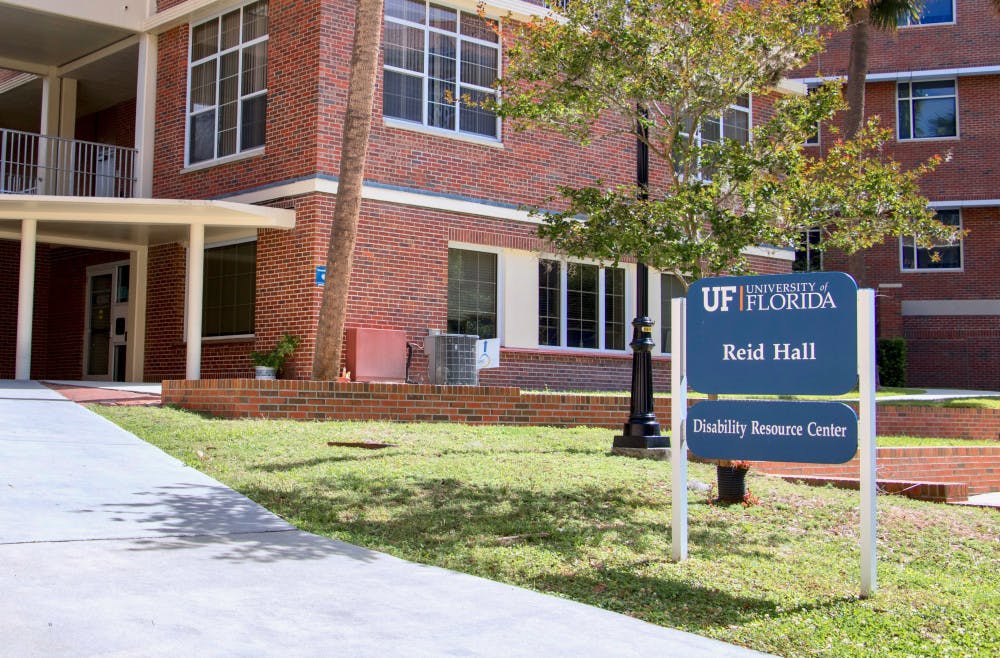Nestled alone in her cubicle, Marti Stein can fidget all she wants.
During past exams, the UF nutritional sciences junior felt like all eyes were on her as she shifted in her seat, trying to keep her heart from racing.
But tucked away in her own room at the Disability Resource Center in Reid Hall, Stein her heartbeat starts to slow down. There are no lingering eyes, no professors to keep her from taking bathroom breaks and no time pressure.
“It takes that whole burden off of me,” the 21-year-old said.
Stein is one of the growing number of students who receive accommodations through the DRC. Students with a physical, cognitive, sensory or psychological condition can use the center to help manage their disability, said director Gerardo Altamirano. But as the number of students using the center climbs, the funding hasn’t.
Ever since Stein was diagnosed with multiple gastrointestinal conditions her junior year of high school, sitting uninterrupted for an exam has become difficult.
She has to think about where the nearest restroom is in case of emergency. She thinks about if she’ll have enough time to finish her exam. She assumed there were no resources to help.
It wasn’t until an intense flare-up and failed calculus midterm her freshman year she was directed to the Disability Resource Center.
During the 2012-13 school year, the center served 1,214 students. This academic year, 3,055 students are registered to receive help from the center. Only one more specialist has been added in the meantime — bringing the team from four people to five.
In October, the center requested an additional 5.2 cents per credit hour from the local fee committee to hire another staff member, which would bring it up to a total of 9.2 cents per credit hour, Altamirano said.
The increase would have given the center about $64,500, Altamirano wrote in an email.
Their request, along with all other requests for fee increases, was denied.
Now, the center is working to meet growing demand with limited resources.
“When there’s limited funds, I think that is when we find ourselves in a predicament like we are currently,” Altamirano said.
Altamirano said the center will request more funds again next year in hopes the committee will choose to raise the student health fee, he said.
“I’m confident that we’ll get that supported, I think it’s just a matter of when that money’s available,” he said.
Currently, the center’s five learning specialists, who meet with students to manage their needs, juggle about 600 students each, he said. This means longer wait times to see specialists and more interaction over email rather than face-to-face.
To combat the limited number of learning specialists, the DRC has brought on five interns to lead support groups for students. It gives students another resource to turn to if the waiting period for their preferred learning specialist is too long, Altamirano said.
Bradley Minotti, a UF psychology sophomore, said sometimes he’ll wait two to three weeks to see his specialist. Despite the backlog, his learning specialist has taken the time to build a personal relationship with him, he said.
A few weeks ago, Minotti, who uses a wheelchair, found himself unable to go to class because an elevator in Keene-Flint Hall was broken. His specialist was able to address his issue immediately and had the elevator fixed.
“I think a lot of people don’t understand all the support services that the DRC provides to people and how many people actually need them,” the 20-year-old said.
Marti Stein believes the center needs to hire another specialist as they grow. She said because UF puts emphasis on being a welcoming and inclusive environment, it should be willing to invest more money in the DRC. While the center’s staff does the best they can with the resources they have, Stein fears it won’t be enough if more students register.
“They’re not functioning all the time at their highest capacity because they just can’t,” she said. “As more students get registered, they’re not equipped to handle all the students.”
Along with longer wait times, the center’s space is packed with students who need to take exams with special accommodations. As of now, more than 11,000 exams are administered at the center, which means students may find testing rooms becoming more crowded, he said.
Limited physical space is one of the most noticeable problems facing the DRC, Stein said. Students spill out of the study space when popular classes have an exam. She worries soon there won’t be enough space to fit all the students who need it.
“You can tell during a huge exam that they’re swamped in there,” she said.
Stein hopes the center gets more funding so all students can use the resources that have helped her over the past three years.
“It’s leveling the playing field and giving you an opportunity that you otherwise wouldn’t have,” she said. “Not having enough money to expand the DRC as a whole … is a huge hindrance.”
Correction: An earlier version of this article incorrectly stated that more than 11,000 students take exams in the DRC a year. More than 11,000 exams are administered in the DRC annually.
Correction: An earlier version of this article stated that the center requested an increase in funds from 4 cents per credit hour to 5.2 cents per credit hour. The center requested an additional 5.2 cents per credit hour.
Contact Jessica Giles at jgiles@alligator.org. Follow her on Twitter at @jessica_giles_.
In the 2012-13 school year, the Disability Resource Center center served 1,214 students. This academic year, that rose to 3,055.






